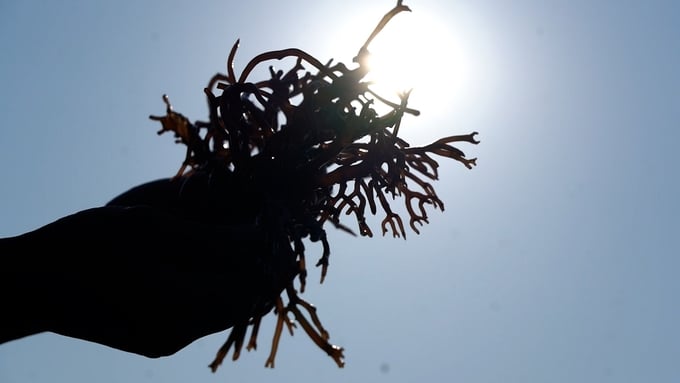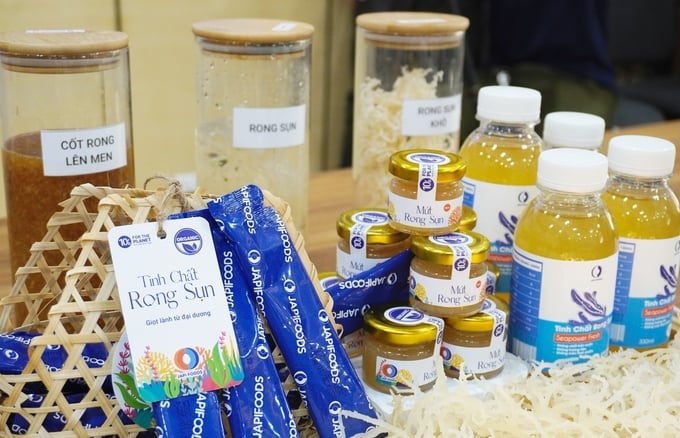November 27, 2025 | 09:38 GMT +7
November 27, 2025 | 09:38 GMT +7
Hotline: 0913.378.918
November 27, 2025 | 09:38 GMT +7
Hotline: 0913.378.918
Mr. Dinh Xuan Lap, the Deputy Director of the International Collaborating Centre for Aquaculture and Fisheries Sustainability (ICAFIS), reported that Vietnam presently has approximately 887 species of seaweed, with approximately 90 of them having substantial economic value. These are classified, as Eucheuma, Gracilaria, Sargassum, Caulerpa, and others. It is worth noting that Eucheuma is one of the categories with a significant potential for offshore cultivation.
The question that Mr. Lap posed was, "How can we effectively cultivate these seaweed varieties?"
He believes that the establishment of dedicated farming zones or integrated farming areas is one of the initial stages in the development of seaweed cultivation. This method would increase the cultivation area and establish favorable conditions for seaweed growth.

Vietnam currently has about 887 species of seaweed, of which about 90 species have high economic value. Photo: Hong Tham.
Furthermore, seaweed contributes to the circular economy. Certain varieties of seaweed can assist in the reduction of methane emissions in livestock husbandry. Mr. Lap emphasized a novel approach to seaweed development: its utilization as a basic material for animal husbandry, particularly cattle ranching. This has the potential to establish a circular value chain, which would reduce greenhouse gas emissions and generate substantial economic value. This model, which integrates aquaculture and livestock husbandry, has substantial potential for the agricultural and fisheries sectors.
STP Group's General Director, Ms. Nguyen Thi Hai Binh, underscored the importance of establishing a sustainable value chain to ensure the long-term success of seaweed cultivation models or Eucheuma.
Ms. Binh stated: "STP Group is genuinely committed to building a '5-star' seaweed value chain, encompassing cultivation and quality control, with a particular focus on commitment throughout the chain."
At present, STP has established connections with approximately 21 cooperatives and more than 100 members. Fortunately, the participants acknowledge the sustainable value of seaweed and are excited to cultivate this industry along with tourism.
However, Ms. Binh emphasized that the most significant obstacle to individuals adopting seaweed cultivation is their perspective. She elaborated, "For generations, we have depended on fishing. It is exceedingly difficult to alter this perspective in order to transition to cultivation. This demands the involvement of the entire political system, as well as the implementation of supportive policies and mechanisms by the government and relevant ministries to motivate individuals to cultivate seaweed."

Our country's seaweed industry is weak in researching value-added products and preserving and processing products. Photo: Hong Tham.
In agreement with this, Mr. Lap noted the obstacles that seaweed producers encounter, such as a lack of comprehension of the complete value of seaweed and environmental, weather, and climate issues. Seaweed is undervalued in comparison to other resources, which restricts producers' willingness to participate, despite its potential.
Mr. Lap emphasized the necessity of robust policy support, which could include financial instruments such as loans, deferred investment, agricultural insurance, and value chain development, to assist producers in the development of seaweed cultivation.
Mr. Lap further stated, "Vietnam can increase its seaweed cultivation area to 900,000 hectares; however, only approximately 16,500 hectares are currently being employed. The expansion of this region necessitates the participation of numerous enterprises, with businesses playing a critical role."
In addition, he underscored the importance of prioritizing ESG (Environmental, Social, and Governance) principles in the development of the seaweed industry, in conjunction with the assistance of government agencies and local authorities.
Additionally, Mr. Lap underscored the indispensable function of research institutes and universities in the seaweed value chain. Scientists must engage more actively in the development of value-added products that satisfy market demands. He emphasized: "We are currently weak in developing value-added products and preserving and processing seaweed products."
"The participation of farmers, businesses, regulatory agencies, banks, and agricultural insurance companies is essential for the establishment of a sustainable seaweed value chain. The value chain becomes comprehensive and sustainable when stakeholders collaborate and engage, which contributes to the growth and global reach of Vietnam's seaweed industry", as the ICAFIS Deputy Director emphasized.
Translated by Linh Linh

(VAN) After the institutional merger, Da Nang possesses significant forest-carbon reserves and is proactively engaging in the carbon market, creating a new revenue stream.

(VAN) An Giang strengthens communication against IUU fishing, increases inspections and sanctions, and is determined to remove the EC’s “yellow card” while developing a sustainable fisheries sector.

(VAN) As green transition becomes a global trajectory, Viet Nam’s biggest challenge is not only technology and models, but how to ensure that capital flows reach the right beneficiaries.

(VAN) The Ministry of Agriculture and Environment must spearhead the construction of green governance, spanning decision-making processes and investment standards to policy evaluation mechanisms.

(VAN) The Agriculture and Environment sector of Khanh Hoa has achieved numerous milestones over the past 80 years, contributing significantly to the goal of establishing the province as a centrally governed city by 2030.

(VAN) Viet Nam is entering the pivotal period of 2025-2030, moving toward the formulation of the Remote Sensing Law, which will establish a legal foundation for the development of national digital data.

(VAN) The agricultural sector is finalizing the strategic framework for emission reduction, setting the goal of sharply cutting methane and 403.7 million tons of CO2 equivalent and moving toward Net Zero by 2050.